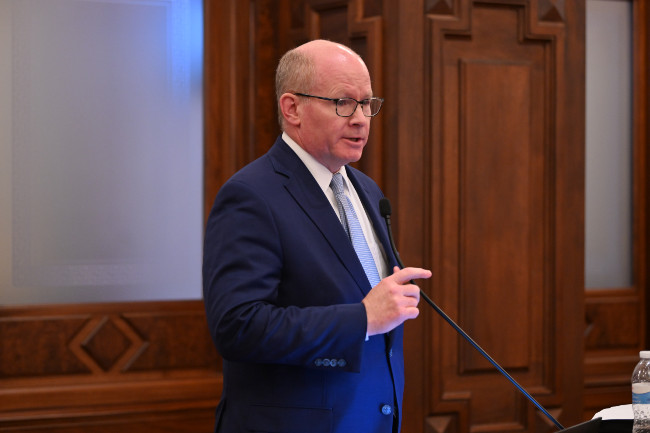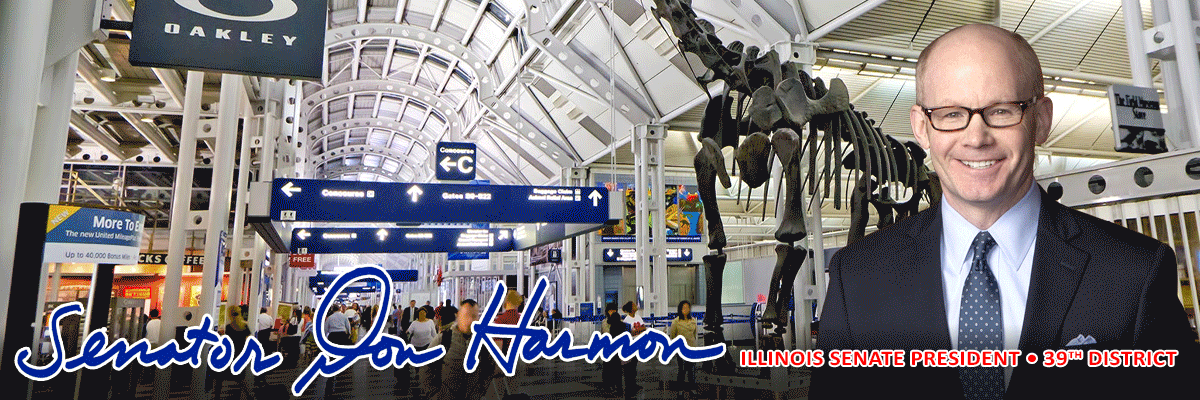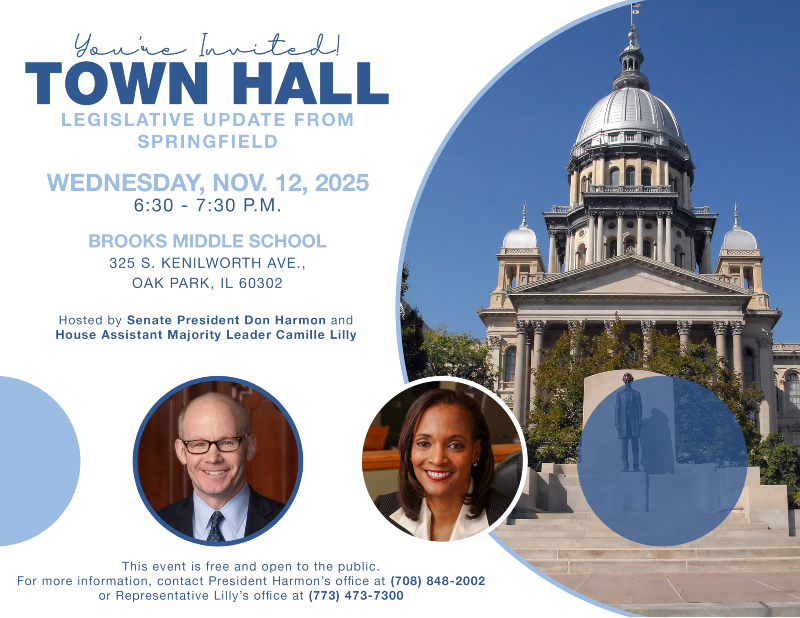Senate Democrats lead landmark legislation to enhance civil rights amid ICE activities
- Details

CHICAGO – Members of the Illinois Senate Democratic Caucus championed a new law aimed at safeguarding residents' constitutional rights and maintaining access to essential public services during increased federal immigration enforcement activity in Chicago and throughout the state.
The law responds to reports of intensive federal immigration operations in Chicago and other Illinois communities that have sparked concerns about potential constitutional violations and reduced access to critical services.
“There is no badge, no title, no mask that puts anyone above the Constitution. This law sends the message that if you abuse your authority, there are consequences,” said Senate President Don Harmon (D-Oak Park). “Our rights follow us into the courthouse, onto campus, at the hospital and when taking our kids to daycare. No one gets to take them away. We are providing the victims of this chaotic federal assault a clear, legal path to go after their abusers and hold them accountable.”
The law encompasses initiatives of the Illinois Senate Latino Caucus to protect Illinois residents’ constitutional rights and ensure safe access to public spaces amid increasingly aggressive violations of those rights in Chicago and across the state.
It will allow Illinois citizens and residents to bring civil actions against any person who deprives them of their constitutional rights while conducting civil immigration enforcement. Punitive damages may be available when agents engage in certain behavior, including: wearing masks to conceal their faces, refusing to identify themselves, or driving vehicles with hidden or altered license plates.
The law will also codify long-standing common law protections to ensure parties, witnesses, and their family members can access the justice system without fear of civil arrest. The law will also create a 1,000-foot safe zone around courthouses, including parking facilities and surrounding streets. Violations carry civil damages for false imprisonment.
“For too long, individuals, especially immigrants and survivors of violence, have feared showing up in public spaces where they have every right to be,” said Senator Celina Villanueva (D-Chicago). “House Bill 1312 reaffirms Illinois’ commitment to protecting privacy and due process by making sure our hospitals, schools and courthouses remain safe and accessible to everyone. We are saying clearly: your rights do not stop at the door.”
The law further will require public colleges and universities to establish procedures for reviewing law enforcement access requests and prohibits the unauthorized disclosure of immigration status.
“Education is a cornerstone of our democracy – a right for all Illinoisans that must be defended, regardless of immigration status. We cannot allow armed, masked federal agents inciting chaos in our communities to deprive our neighbors of their constitutional rights,” said State Senator Karina Villa (D-West Chicago). “Despite the federal administration’s attempts to stifle justice and due process, Illinois will continue to uphold these fundamental rights for every person that calls our state home.”
Similarly, all Illinois hospitals will be required to develop comprehensive policies for law enforcement interactions by early 2026, with $500 daily penalties for noncompliance. Licensed daycare centers will also be required to adopt policies for interacting with law enforcement, including parental notification and consent requirements before sharing children's information, while prohibiting disclosure of citizenship or immigration status unless legally required.
“As aggressive immigration enforcement continues to spread, Illinois will stand as a pillar of accountability and justice. We will not allow ICE to go unchecked as they endanger our children and sow chaos in our communities,” said State Senator Omar Aquino (D-Chicago). “In Illinois we will continue to protect each of our residents, regardless of immigration status.”
House Bill 1312 was signed into law Tuesday and takes immediate effect.
Senate Democrats pass landmark legislation to enhance civil rights amid ICE activities
- Details

SPRINGFIELD – Senate President Don Harmon advanced legislation out of the Senate on Thursday responding to infringements on personal liberty by federal immigration agents in Illinois.
“Masks might conceal their faces, but they can’t hide the constitutional abuses we’ve seen daily,” said Harmon (D-Oak Park). “This gives the growing number of victims a clear, legal path to go after the abusers and hold them accountable.”
The measure encompasses initiatives of the Illinois Senate Latino Caucus to protect Illinois residents’ constitutional rights and ensure safe access to public spaces amid increasingly aggressive violations of those rights in Chicago and across the state.
It would allow Illinois citizens and residents to bring civil actions against any person who deprives them of their constitutional rights while conducting civil immigration enforcement. Punitive damages may be available when agents engage in certain behavior, including: wearing masks to conceal their faces, refusing to identify themselves, or driving vehicles with hidden or altered license plates.
The measure would also codify long-standing common law protections to ensure parties, witnesses, and their family members can access the justice system without fear of civil arrest. The legislation would create a 1,000-foot safe zone around courthouses, including parking facilities and surrounding streets. Violations would carry civil damages for false imprisonment.
“No one should have to choose between seeking justice and risking their freedom,” said State Senator Celina Villanueva (D-Chicago). “Courthouses must be places where people can resolve disputes, testify and support loved ones – not be sites of fear or intimidation. This measure ensures that everyone, regardless of background or immigration status, can safely access the justice system without the threat of being detained or harassed. Justice cannot exist where fear takes its place.”
The legislation further would require public colleges and universities to establish procedures for reviewing law enforcement access requests and would prohibit unauthorized disclosure of immigration status.
“No one should have to look over their shoulder when they go to class. These are places of learning – not fear,” said State Senator Karina Villa (D-West Chicago). “In Illinois, we choose compassion over cruelty. By protecting our college campuses from ICE intrusion, we’re saying loud and clear that every person deserves to feel safe, respected and valued in our communities.”
Similarly, all Illinois hospitals would be required to develop comprehensive policies for law enforcement interactions by early 2026, with $500 daily penalties for noncompliance. Licensed daycare centers would also be required to adopt policies for interacting with law enforcement, including parental notification and consent requirements before sharing children's information, while prohibiting disclosure of citizenship or immigration status unless legally required.
“Daycares and hospitals should be places of safety and security, not targets of intimidation. No parent should have to wonder if dropping off their child could put their family at risk, and no person should fear if going to get medical attention will cause them more suffering,” said State Senator Omar Aquino (D-Chicago). “We’ve already seen ICE agents come into a hospital room in my district. We’re not talking about what could happen – it’s already happening. The time to act is now.”
House Bill 1312 passed the Senate Thursday.
More Articles …
Page 1 of 31







